Clifford Garstang's Blog, page 73
August 27, 2013
Guest Post: Stefanie Freele
 Horrified Faces and Other Unexpected Encounters While Marketing My Books
Horrified Faces and Other Unexpected Encounters While Marketing My Books
Stefanie Freele
(Author of Surrounded by Water, Press 53 and Feeding Strays, Lost Horse Press)
Although I am certain I did not presume Oprah would appear at my door with a new outfit and a bouquet the moment my recently released books arrived via UPS, in retrospect I do not recall what I expected would happen next. First, I experienced the seemingly-universal delightfully shaky-handed feeling of opening up the just-arrived box of the worked-so-hard-and-here-it-is published masterpiece. Next I had hopes for success and fear of failure, who doesn’t? And then, the daunting in-your-face responsibility: time to sell the book. Other authors warned me about the hard work marketing the book would be, little pay, lots of gas, reading to the occasional mostly-empty room. I had those events to anticipate, but a few head-shakers happened along the way, starting with:
The varied reactions of bookstore owners
The first local bookstore I approached gave me the forms to sign for selling books on consignment, invited me to do book signings in their small local chain and congratulated me on my new short story collection. They were professional and curt.
It was a very good thing I stopped there first because my second local bookstore experience was crushing. The owner took my book with the enthusiasm of a four year-old eating broccoli, went to the back room and returned in mere seconds, unapologetically telling me in the exact tone of my third grade math teacher how she could not sell my book because, “You’re not famous enough.” If I had tried this particular store first, I might have stashed all my books under the bed and myself under the covers for an undisclosed period of time.
In contrast, Gallery Bookshop in Mendocino, which just might be the coolest bookstore on the West Coast, ordered my books ahead of time from the publisher, welcomed me with enthusiasm, made me a lovely flyer and hosted two readings for me, complete with drinks and snacks. How did they know I love snacks? By the way, the Gallery Bookshop has a webcam linked to their site which shows the current ocean view from the store. At the moment the view is misty and mysterious.
Brushes with famous people
I was told that my first collection, Feeding Strays was on the fiction shelf next to James Frey and now my new book also. “Come to think of it,” the store owner said, “wherever your books go, they will always be next to James Frey’s.”
When I arrived at Gallery Bookshop to read (mentioning again that they are the coolest bookstore), on the table was my book Surrounded by Water and Cheryl Strayed’s Wild, as Ms. Strayed was reading the next day. The books looked very good together and perhaps should be sold as companion pieces.
The Awkward Radio Interview Process
I have been interviewed for radio a few times and each experience has been generally uncomfortable, but none as much as the one where five of us were stuffed in a hot room the size of a common bathroom stall. As I read a story about two characters clandestinely removing a dead body from a hearse, one of the interviewer’s faces began to morph into a horrified expression which grew exponentially with every word I uttered. Inside, I was panicking and trying not to let the panic be noted in my voice: I did not know whether to stop reading, burst out laughing, or run from the room. Instead, I tried not to look at her and continued on. I believe the next author read a poignant piece about gardening.
The encouragement from all parts of the world and even out of nowhere
In addition to the mounds of encouragement and support from friends and family: A childhood neighbor from Wisconsin bought a box full of signed books for his employees and relatives. A woman I’ve never met before burst into a signing announcing she is my biggest fan and gave me a huge breathless hug. Two writing conferences asked me to be their keynote speaker (me?!). Students from a film school requested to make projects from two of my stories. A reader from Australia pleaded with me to write more. As if I just might stop writing. Ha.
Ha.
Stefanie Freele was born and raised in Wisconsin, and currently lives near a river (but not near enough) on the Northwest coast. Her stories have appeared or are forthcoming in several literary magazines, journals and anthologies including Glimmer Train, Mid-American Review, Western Humanities Review, Sou’wester, Quarterly West, The Florida Review, Night Train, Prime Number Magazine, American Literary Review, Word Riot and Pank.
Awards for stories in Surrounded by Water include First Place in the Glimmer Train Fiction Open for “While Surrounded by Water”; Second Place in the Glimmer Train Family Matters Contest for “Us Hungarians”; a 2010 Million Writers Notable Story award for “Buccaneers”; an Editor’s Pick in the Mid-American Review Fineline Competition for “Removal of Oneself From Corporate Identity”; and a Pushcart Prize nomination for “Pozniejszy.”
Stefanie received a Kathy Fish Fellowship from SmokeLong Quarterly and served as Writer-In-Residence. She was also the 2010-2011 Healdsburg Literary Laureate. Her first short story collection,Feeding Strays (Lost Horse Press), was a finalist for the Binghamton University John Gardner Fiction Book Award and the Book of the Year Award from Foreword Reviews.
August 23, 2013
ZHANG BOYS a Finalist for the Library of Virginia Award
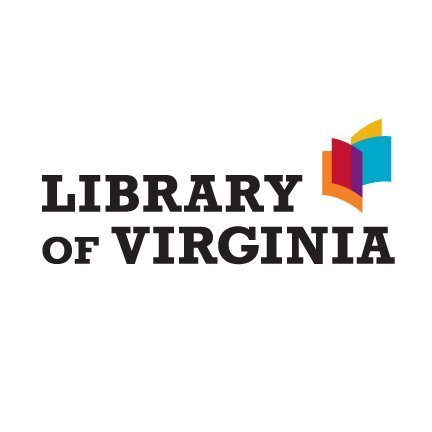 I learned recently that I am a finalist for the 2013 Library of Virginia Award for Fiction for my book What the Zhang Boys Know. I am truly honored to be one of three finalists, particularly given the other nominees and the two other finalists: The Yellow Birds by Kevin Powers and The Right-hand Shore by Christopher Tilghman. Both of the other books have received wide recognition, and it’s amazing to me have my book considered for the same award.
I learned recently that I am a finalist for the 2013 Library of Virginia Award for Fiction for my book What the Zhang Boys Know. I am truly honored to be one of three finalists, particularly given the other nominees and the two other finalists: The Yellow Birds by Kevin Powers and The Right-hand Shore by Christopher Tilghman. Both of the other books have received wide recognition, and it’s amazing to me have my book considered for the same award.
The winners in all categories (fiction, poetry, non-fiction, plus several special awards) will be announced on October 19 at ceremonies in Richmond that I am really looking forward to. For a complete list of the finalists, go here.
August 22, 2013
Hampton Roads Writers’ Conference
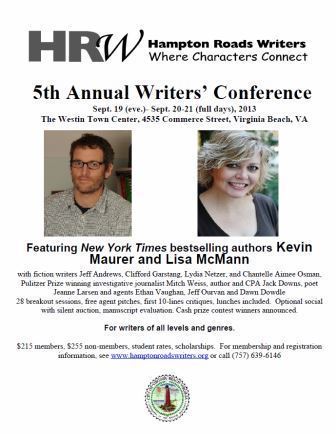 I am excited to be one of the presenters at the 5th Annual Hampton Roads Writers’ Conference, which is just a month away.
I am excited to be one of the presenters at the 5th Annual Hampton Roads Writers’ Conference, which is just a month away.
The program looks great, discounting the fact that you have five opportunities to hear me talk. Faculty includes Jeff Andrews, Kevin Maurer, Lisa McMann, Lydia Netzer, Jeanne Larsen, and several others. It all starts on the evening of September 19 and runs through Saturday, September 21.
Registration is still open, so take a look at the program. I’m sure you’ll find something that will interest you.
2013 Reading: Everyday Book Marketing by Midge Raymond
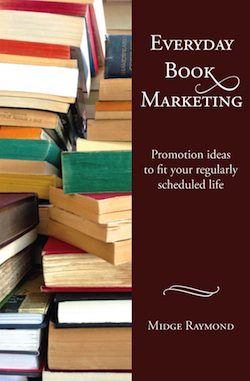 Everyday Book Marketing: Promotion ideas to fit your regularly scheduled life by Midge Raymond
Everyday Book Marketing: Promotion ideas to fit your regularly scheduled life by Midge Raymond
Ashland Creek Press (2013)
Midge Raymond, the author of Everyday Writing: Tips and prompts to fit your regularly scheduled life as well as the wonderful short story collection Forgetting English (Press 53, 2011) has now published an extremely helpful guide to book marketing. It doesn’t matter whether your book is forthcoming or long since published, or if it will come from a big press, a small press, or be self-published, you’ll find this book filled with tips you can use.
The book includes a detailed discussion of the marketing process, starting with the important advice that the author should begin taking steps to market the book long before the book is actually published. But it goes on to provide a thorough discussion of blogging, platform building, contact-list building, websites, review copies, the book launch, and what to do next. In addition, however, a significant portion of the book is devoted to question and answer sessions with authors (including those who are traditionally published and self-published; fiction writers, memoirists, poets; best-sellers and emerging writers), publicists, event coordinators, and others. These sections are fascinating and give the reader great insights from people who have been there and done that.
Need to know how to arrange bookstore events? Check the Q&A with a couple of event coordinators with plenty of experience. Need to know what to put in your website? Check the chapter on author websites. Considering hiring a publicist? Take a look at the chapter on publicists and also read the Q&A with an experienced publicist. The book also provides tips for your book launch party, your Amazon.com Author Central page, how to get the most out of Goodreads, and a lot more. I’ve been through this a couple of times now, and I still learned a lot reading this book. (It’s available both in paperback and eBook formats.)
I have one minor complaint about the book, and that is that there is some wonderful information in the Q&As with the authors and publicists, but it can be a little hard to find. Some of these items are mentioned in the corresponding sections of the main text, but not all of them are. An index might be helpful, but in the meantime you might want to take notes as you’re reading the book–or make notes in the margins or tab pages with post-it notes–when you come across something you know you’ll want to come back to later. Not that it would hurt you to reread the book to find these gems, but there’s only so much time in the day. Which is exactly why this book can be so helpful.
August 19, 2013
The New Yorker: “Victory” by Yu Hua
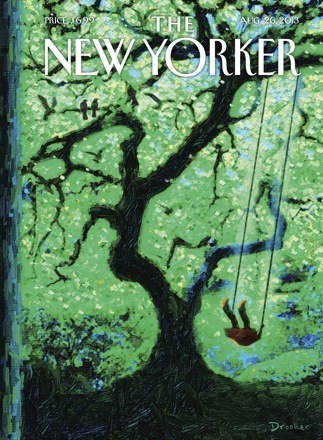 August 26, 2013: “Victory” by Yu Hua
August 26, 2013: “Victory” by Yu Hua
Lin Hong is married to Li Hanlin. While Li is traveling on business, Lin finds a key that opens a drawer in Li’s office in which he has hidden photographs of and letters from a woman named Qingqing. Lin is distraught and seeks the advice of an old friend, who suggests a course of action to punish Li. When Li comes home, Lin confronts him. He confesses, but says that the “affair” never went beyond kissing. Unsatisfied, Lin carries out the punishment, which is nearly as painful for her as it is for her husband.
In the end . . .
I hate to spoil the story, because it isn’t clear right until the last minute what’s going to come of this couple. I will say only that I enjoyed the ratcheting up of the tension between Lin and Li as the story goes on. This is very well done. Whether the story has much depth—that is, does it say something about the value of forgiveness?—is less clear to me. I’ve enjoyed Yu Hua’s longer work, but I’m not sure there’s much beneath the surface of this short story.
August 18, 2013
The New Yorker: “Meet the President!” by Zadie Smith
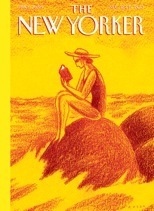 August 12 & 19, 2013: “Meet the President!” by Zadie Smith
August 12 & 19, 2013: “Meet the President!” by Zadie Smith
I see no helpful Q&A with Zadie Smith to guide us through this story, so we’re on our own. (If you’ve come across the Q&A, please leave a comment.)
It’s the future, I guess. Billy Peek is 15, traveling with his father and is currently on the UK coast trying out some new-to-him technology when he meets Melinda, 49 , and Aggie, 9. The technology appears to be video-game like and Billy is moving through levels, his goal being to wipe out guards outside the Oval Office and meet the president.
But the woman and child—not related, Billy knows by doing a scan with his machine—are on their way to the funeral of Aggie’s older sister. In this post-apocalyptic (apparently) world, the sister had survived as a whore, but maybe there’s more to it than that. When Melinda disappears (why?), Billy helps Aggie get to the funeral (which isn’t really a funeral and isn’t really in a church). As they walk, Billy is distracted from his game and . . .
I’m not really sure what happens, although in the end Billy is forced to see reality—and real dead girl.
Thoughts about this?
2013 Reading: The Virginis by Pamela Erens
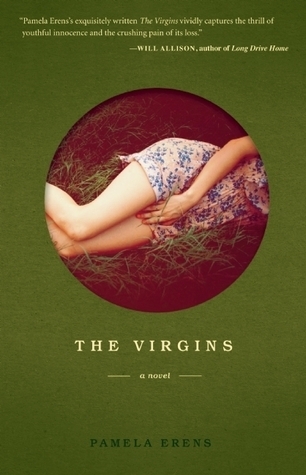 The Virgins: A Novel by Pamela Erens
The Virgins: A Novel by Pamela Erens
I loved Pamela Erens’s first novel,  The Understory. Like that book, her new novel is beautifully written. Every sentence is elegant and perfect, and they all flow together to create a lush whole.
The Understory. Like that book, her new novel is beautifully written. Every sentence is elegant and perfect, and they all flow together to create a lush whole.
I know the author (she was kind enough to mention me in the acknowledgments, although I had nothing to do with the writing of this book and didn’t see any part of it in draft), but I can say that my reaction to the book is in no way colored by that. Given the subject matter–teenagers in a boarding school–I probably would not have read the book if I didn’t know the author, but that would have been a shame. I would have missed out on something special.
For me, what stands out about this book (apart from the beautiful prose) is the narrative voice. The story is about star-crossed lovers, Seung Jung and Aviva Rossner, but it is told by Bennett-Jones, a voyeuristic boy who lusts after Aviva (and judging by the language he uses to describe Seung, may also have a thing for her boyfriend) and who mostly imagines the lovers’ relationship. He describes in detail their comings and goings, their thoughts, their conversations, even though he can’t possibly know them. True, he has pieced together bits of the narrative by asking his old classmates about what happened that year, but mostly he’s painting his own mental picture. Of course, he does play a role in the story, too, although the reader understands that he’s not entirely reliable. The overall effect is fascinating.
I usually don’t read reviews until after I’ve finished a book, but I did read this one by John Irving that appeared in last weekend’s New York Times: Pamela Erens’s The Virgins.
2013 Reading: Animal Liberation by Peter Singer
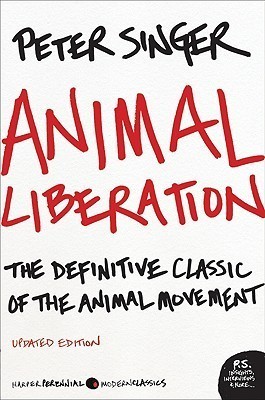 Animal Liberation: The Definitive Classic of the Animal Movement by Peter Singer
Animal Liberation: The Definitive Classic of the Animal Movement by Peter Singer
I actually read the previous (2002) edition of this book, first published in 1975 because I’ve been meaning to read it for a long time and only did so because my Reading Liberally book club chose it for this month.
The book makes the case for better treatment of animals: elimination of research on animals and the end of industrial farming of animals for human consumption. But it goes beyond that and also makes the case for vegetarianism and veganism. While I don’t know if I’ll be able to put vegetarianism into practice, it’s a compelling case, one that I first accepted when I read a much shorter book, Moral Literacy: Or How to Do the Right Thing by Colin McGinn. Both books rely on the notion of suffering to conclude that it is wrong to kill or otherwise abuse animals as we do. McGinn’s book is purely logical, while Singer piles on the gross details of industrial farming and testing laboratories. The principle for both of them is equal consideration of equivalent interests–basically that human rights do not trump animal rights. I have to say that they both make compelling arguments.
What to do about it?
Do I become a vegan or a vegetarian? Most probably. (Maybe I’ll start as a pesco-lacto-ovo vegetarian and see how that works out . . .)
August 15, 2013
Reflections on Sewanee

It’s been 10 days now since the end of the 2013 Sewanee Writers’ Conference, time enough for a little reflection on the experience.
It wasn’t my first time at Sewanee, although it was my first time in the playwriting workshop there. My previous visits were in 2004, 2006 (as a Tennessee Williams Scholar), 2008, and 2010 (as a Walter E. Dakin Fellow), all in Fiction workshops, so I’m very familiar with the conference and, as should be obvious from my recidivism, I love it. Going back as a participant after having been a Fellow is a little odd, I have to say, although probably that is entirely in my head. The hierarchy at Sewanee is minimal, and so it mattered not at all to others. I didn’t do a reading—either scheduled or of the open mic variety—but my books were available in the bookstore, and I didn’t hesitate to spend time at the French House (the party spot for the conference), so the experience of being there as a former Fellow was almost the same as being a Fellow. (In fact, it was better, because there were circumstances that detracted from my Fellowship year, but that’s another story.)
What was somewhat different this year was that I was in the playwriting workshop. Although I am new to playwriting, I loved the workshop. The leaders, Daisy Foote and Dan O’Brien, both accomplished playwrights, were fun and insightful. Our workshop had three Fellows, all with considerable experience, so they also provided wonderful comments. And most of the participants had also done a fair amount of work in theater, too. A good bunch. But the workshop ran somewhat differently from most fiction workshops I’ve been part of. For one thing, we spent a good amount of time reading the plays aloud. The writer would “cast” the play from among the workshop participants and then we would read 15 or 20 pages of the script. That took a lot of time away from discussion of the work, but in its own way was extremely helpful. I loved hearing people—including some skilled actors—read my dialogue. The discussion of the work was, however, a bit superficial, I thought. I would like to have looked at the words on the page more. Instead, though, we talked more about the big picture. Helpful, certainly. Just different from what I’m used to.
But because I am more a fiction writer than a playwright, I wasn’t content just to attend my own workshop. The way Sewanee is set up, it’s possible to sit in on other workshops on the days between your own workshop meetings. I opted to sit in on the workshop led by Tim O’Brien and Christine Schutt (with their permission). I knew both Tim and Christine from previous Sewanees, and in fact Tim blurbed my first book, and Christine blurbed my second. So I knew both of their styles in workshop and I was looking forward to seeing them in action. I have to say that it was pretty great. No doubt it helped that the participants, scholars, and Fellows in the workshop were all bright and articulate, but this was one of the best workshops I’ve ever seen. Tim and Christine were excellent together. They both focus first on the sentence level but are capable of pulling back to look at bigger issues. They are both primarily constructive in their critiques. And they will both extract from the work under consideration lessons that can be applied to everyone—including themselves. It was a marvel, and I took page after page of notes. Even though I’d heard much of it before from the two of them, it was an excellent reminder that I am trying to employ as I work through revisions of my novel.
So in this edition of Sewanee, I was extremely busy. Instead of workshopping every other day, which is the norm, I was in workshop every day. (I even tried to read or skim the work for the fiction workshop on top of the plays we were discussing in the playwriting workshop.) Although I was busy, I still managed to get to almost every reading and panel discussion (I confess that I skipped a few of the editors’ panels that I’d heard before), including several of the open mics. And I went to the French House almost every night.
I got none of my own writing done. I read no stories in the Prime Number submission queue, although I’d intended to. I didn’t get much sleep.
I think I did things exactly the way they’re meant to be done. Although this was my 5th Sewanee, I think it was my best.
August 14, 2013
Online Creative Writing Classes
 As much as I love face-to-face fiction workshops and critique groups, sometimes they’re just not feasible. Either you live too far away from other writers or a school that offers classes, or your schedule is too tight to attend. With online classes, though, you can still attend a class or workshop, and usually you can do it in a way that fits your schedule.
As much as I love face-to-face fiction workshops and critique groups, sometimes they’re just not feasible. Either you live too far away from other writers or a school that offers classes, or your schedule is too tight to attend. With online classes, though, you can still attend a class or workshop, and usually you can do it in a way that fits your schedule.
I teach through Writers.com, a “school” that offers classes in many genres. My short story class is beginning in a few weeks, and I would encourage you to check it out. It’s a ten-week class in which we’ll cover in depth the fundamentals of short story writing and we’ll also workshop stories by the class members. There are no “live” sessions so the learner can log on at any time and do the work when it is convenient to him or her. Check out the details: Writing the Short Story: Make Your Story Great. And if you’re interested in other genres, look into the other offerings.
It’s the competition, but I thought I would alert you to another opportunity. (In truth, there are many online writing classes one could take.) The Tinker Mountain Writers’ Workshop, which I’ve attended a few times, is now offering online classes. There are initially three classes, one each in poetry, fiction, and non-fiction, taught by Luke Johnson, C.L. Bledsoe, and Constance Adler, respectively. It sounds like a good program, although it’s considerably more expensive than the Writers.com classes are.
I actually think creative writing lends itself to online learning, so you might want to consider one of these classes.



